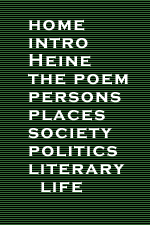| 10 |
And
see! in the pallid light of the moon,
A shape colossal towering!
'Tis Cologne's great minster against the sky
Like a devil darkly lowering.
dt
text .
|
•
minster: cathedral (as in III:1).
•
|
| 11 |
It
was built to be the mind's Bastille;
The hope that the Papists cherished
Was that German thought, imprisoned there,
Would languish till it perished.
dt
text .
|
•
Bastille: since at least the eighteenth century,
and in particular, since the French Revolution of 1789,
the Bastille prison in Paris had come to serve as shorthand
for tyranny and arbitrariness. Here Heine cleverly distills
the issue: Whereas the Bastille imprisoned the men whose
minds generated subversive ideas, the medieval cathedral
was a prison for the mind itself. And yet at the same
time, as in the case of Menzel (IV:7), the modern or
contemporary example is presented as the more insidious
half of the comparison.
•
Papists: derogatory word for Catholics, those
loyal to Rome above all else. Heine uses the German,
"Römlinge," equivalent to the English
"Romish."
|
| 12 |
But
Luther arrived with his thundering "Halt!''—
Cried out on their hope, and killed it.
The cathedral stands as it stood that day;
Complete, they will never build it.
dt
text .
|
•
Luther/they will never build it: Begun in the mid-thirteenth
century, construction was halted during the Reformation. |
| 13 |
It
will never be finished—and that is well;
For thus, in its baulked ambition,
As a monument of our German strength,
It fulfils a Protestant mission.
dt
text .
|
•
x |
| 14 |
The
bells on your charity-bags may ring;
You will fail, though you even solicit
From Jews and heretics shameless alms;
Tis an idle dream—dismiss it.
dt
text .
|
•
Jews and heretics: As several commentators note,
Heine himself was involved in the effort to complete the
cathedral as recently as 1842. His point here, of course,
is political rather than personal. |
| 15 |
In
vain for this object the great Franz Liszt
May give concerts justly lauded,
And a talented king declaim himself hoarse,
By a loyal people applauded.
dt
text .
|
•
Franz Liszt (1811-86): the celebrated virtuoso
and composer;performed a benefit concert in September
1842. |
| 16 |
The
cathedral will never be built to an end;
Though the Swabian fools have striven
To help to that consummation accurst,
By the shipload of stones they've given.
dt
text .
|
•
Swabian fools (once again!): Stones allegedly sent
for construction of a window facing toward Swabia. |
| 17 |
It
will never be finished, however loud
May clamour the owl and raven—
Those mediaevally-minded birds
Who house in the steeple's haven.
dt
text .
|
•
owl and raven: symbols of darkness and death, and
also, reactionary social and political views. |
| 18 |
Nay,
more than that, the time will come—
I speak no foolish fable—
When the minster, far from achieving your dream,
Will be used as a common stable.
dt
text .
|
•
used as a common stable: one symbolic practice
of the French Revolution was to turn monasteries and other
church buildings (symbols of passivity and parasitism)
into "useful" structures such as stables. One
of the most notorious occurrences involved the great Benedictine
abby of Cluny, but other examples occurred in the Rhine
territories. |
| 19 |
Then
where shall we put 'tis a puzzle indeed
To decide what the proper course is—
The Holy Three Kings of the Morning Land,
When the minster's a stable for horses?
dt
text .
|
•
The Holy Three Kings: from the Nativity story.
According to tradition, the relics of these saints were
housed in a shrine in the cathedral. |











